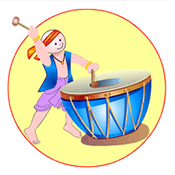
Dimdima
Online Children's Magazine from India

Dimdima
Online Children's Magazine from India

American medical researcher and virologist, Jonas Salk who discovered and developed the first successful inactivated polio vaccine, was born a hundred years ago.
IN 1947, Jonas Edward Salk became head of a project to study polio viruses at the University of Pittsburg. In those days in the United States, as in the rest of the world,thousands of children fell prey to polio each year. Many of the victims died; many more survived but became crippled for life (one notable example was former U.S. President F. D. Roosevelt who contracted the disease in 1921 and remained a cripple for the rest of his life).
In the 1930s, attempts had been made to develop an effective polio vaccine, but no one had succeeded in producing one. Salk began research on polio vaccines and worked
tirelessly to produce one himself. In 1953, he announced he was ready to test a vaccine he had prepared. The vaccine contained polio causing viruses that had been killed with a formaldehyde solution.
He expected that when the dead viruses were introduced into the body, it would produce antibodies that would then resist living polio viruses if they invaded the
body. Salk, his wife and three sons were among the first to receive the vaccine.
In 1954, it was decided to test the vaccine on a large scale. Parents were at first reluctant to let their children be vaccinated because they were afraid the vaccine would give them the disease instead of protecting them against it. Salk went on television to explain how the vaccine worked and to request the co-operation of parents. Subsequently 400,000 children were administered the vaccine. It was found to be safe and effective.
Within another seven years, polio was virtually wiped out in the United States.
In 1960, another American, Albert Sabin, developed a polio vaccine that could be taken by mouth. The Sabin oral vaccine is easier to administer and its effects last longer.
The use of these two vaccines has resulted in the eradication of polio from many parts of the world.
EXPLORE MORE...
Get Help or Give Help.
- Do you have a Science Question?
- Post it here and get the answer.
- Some questions posted by others are not yet answered.
- View those questions and answer them.
Dimdima is the Sanskrit word for ‘drumbeat’. In olden days, victory in battle was heralded by the beat of drums or any important news to be conveyed to the people used to be accompanied with drumbeats.
Bharatiya Vidya Bhavan
K. M Munshi Marg,
Chowpatty, Mumbai - 400 007
email : editor@dimdima.com
Bharatiya Vidya Bhavan
505, Sane Guruji Marg,
Tardeo, Mumbai - 400 034
email : promo@dimdima.com
Dimdima.com, the Children's Website of Bharatiya Vidya Bhavan launched in 2000 and came out with a Printed version of Dimdima Magazine in 2004. At present the Printed Version have more than 35,000 subscribers from India and Abroad.